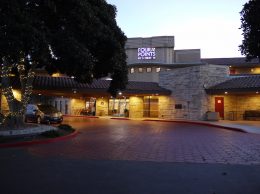 Two Marriott hotels in Oxnard are at the center of a legal fight that leads back to some of the biggest players on Wall Street.
Two Marriott hotels in Oxnard are at the center of a legal fight that leads back to some of the biggest players on Wall Street.
The Residence Inn by Marriott and the Courtyard by Marriott in Oxnard are both being foreclosed upon and face lawsuits asking for court appointment of a receiver to step in and take control of the properties. A partnership filed suit in Ventura County Superior Court in mid-November against the hotels’ owner, an entity owned by an arm of Swiss finance titan Credit Suisse.
The complaints allege that the two Marriotts are part of a $130.1 million loan that is in default, with $18.5 million past due. The loan also covers a hotel in Riverside, two in Sacramento and one in Oregon. The borrowers stopped paying in September 2009 and now owe $162.8 million with interest, the suit claims.
The plaintiff is seeking the appointment of a receiver to manage the properties, collect revenues and maintain them until a new owner is found. The complaints also allege that Lighthouse Lodging Group — the Los Angeles-based firm that operates the hotels — is mismanaging the properties and “harming the goodwill of the hotel in a manner that is further deteriorating” their values.
Brian Alonge, a principle at Lighthouse and a spokesman for the borrower, said negotiations on a loan modification are under way. He would not comment on the mismanagement allegations.
James DeRoche, an attorney for the lender, said he wasn’t sure whether or not his client and the borrower are in negotiations. “There are many moving parts to something like this,” he said. “Typically before loans of this magnitude go tripping into court, there is some negotiating. … But until a deal is struck, my instructions are to proceed with the litigation.”
According to the lawsuit, a $130.1 million loan was made in 2007 by European real estate bank Eurohypo AG to a Credit Suisse partnership that purchased the six hotel properties.
Soon after, the Marriotts’ mortgage was bundled into a $2.8 billion bond securitized by Merrill Lynch, regulatory filings show. The plaintiff in the recent lawsuits is MLCFC 2007-9 Western Lodging Limited Partnership, which acts as a trustee for ML-CFC Commercial Mortgage Trust 2007-9, the entity that issued those bonds.
A commercial mortgage-backed security, as such bonds are known, give investors the right to buy in and receive payments from a pool of borrowers. But as the nation’s real estate markets took a turn for the worse, many mortgage-backed securities turned sour and gummed up the credit markets, ultimately contributing to the crash of the financial system.
The borrower in the loan and the defendant in the suit is RECP CY Oxnard LLC, a partnership that regulatory filings show is owned and controlled by a subsidiary of DJL Real Estate Capital Partners, an arm of investment bank Credit Suisse.
Business as usual
Business at the Oxnard Marriotts isn’t affected by the lawsuits, said Alonge of Lighthouse.
Earlier this year, the general manager for the two properties told the Business Times they were doing quite well, buoyed by business from the nearby Naval Base Ventura County, which often has visitors and contractors booking extended stays.
“Our location is very advantageous, as is the Marriott brand, as is the years of referrals and service and doing business,” General Manager David Dreher said in July. He declined to comment for this article.
The 252-room Marriott Residence Inn is on Vineyard Avenue, next to Oxnard’s River Ridge golf course. The all-suites hotel was built in 1987, and about $4.8 million in capital improvements were added to the property over a four-year period starting in 2006, according to filings with the U.S. Securities and Exchange Commission.
The Residence Inn received $36.9 million of the 2007 loan amount, according to SEC documents filed that year, although the property’s appraised value was reported at $48 million then.
Two miles down the road is the 166-room Courtyard by Marriott, built in 1975 and renovated in 2003. The hotel on Esplanade Drive was formerly a part of the Hilton franchise, but was converted to a Marriott in 2003. It received $15.6 million of the loan amount and was valued at $23.5 million in 2007, according to SEC filings.
Although the Courtyard hotel shares a parking lot with Topa Financial Plaza, the business center is “absolutely not” connected to the hotels, a Topa property manager told the Business Times.
Pressing reset
Standard & Poor’s recently reported that delinquencies on commercial mortgage-backed securities continue to rise, albeit at a slower pace than before. The delinquency rate on loans packaged as bonds climbed 3 percent in the third quarter, S&P said Nov. 23, compared with a 14 percent increase in the second quarter and a 30 percent spike in the first quarter of 2010.
Hotels are faring particularly poorly. In its monthly report on mortgage-backed securities, Moody’s Investors Service said hotel properties lead the pack in delinquency rates, at 16.4 percent in October.
Michael Barnard is the founder of Blu Hotel Investors, a Santa Barbara-based hotel investment firm launched earlier this year, and a Marriott Corp. veteran. Although not associated with the two Marriott properties in Oxnard, he said that for many hotels in Ventura County — especially the higher-priced brand-name properties — over-supply further drove profits down.
“I don’t think it’s necessarily a tougher market, it’s just that a huge number of nice hotels have been built there over the past four years,” he said.
He estimated that hotel room supply in the county has increased approximately 40 percent in recent years. That, coupled with a general decline in tourism, may have been too much for some hotels to bear.
“You’re going to see a bunch of hotels come to market in the next six to eight months,” Barnard said.
After that, expect the industry to begin to stabilize. “Because there’s no more financing, there’s no new supply,” Barnard said. “That’s good for existing hotels. And hotels that were broken will be fixed — the reset button will have been pressed on many of those hotels that were overleveraged.”
Are you a subscriber? If not, sign up today for a four-week FREE trial or subscribe and receive the Book of Lists free with your purchase.






 Print
Print Email
Email
















